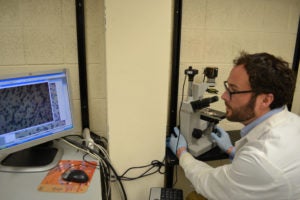Campus News
Rockford.edu / News
CFNIL awards Lyme disease research grant to Rockford University professors
03/08/2018 1:51 pm
Three Rockford University professors have received a $14,000 grant to study the spread of Lyme disease in northern Illinois from the Community Grants Program of the Community Foundation of Northern Illinois (CFNIL).
Associate professors of biology at RU — Troy Skwor, Ph.D.; James Marshall, Ph.D.; and Chemical and Biological Sciences Department Chair Sean Beckmann, Ph.D. — are collaborating on “Lyme Ecology in Northern IL: From Voles to Birds to Humans.” Funded for two years by the CFNIL, the project is an expansion of Dr. Beckmann’s research into how rodents can spread the disease, which yielded two previously unknown carriers of Lyme — meadow jumping mice and 13-lined ground squirrels.

“Ticks themselves are not born with Lyme disease,” Dr. Beckmann explains. “They have to acquire it by feeding on the blood of another animal that is infected. We call this a reservoir. For Lyme disease, the traditional reservoir has been the white-footed mouse, Peromyscus leucopus. However, Lyme exists in areas and ecosystems outside of the range of this mouse.”
Reports of Lyme disease have doubled in northern Illinois in the last 15 years, according to the Centers for Disease Control and Prevention. Beckmann describes the region as “one of the hotspots for the disease in Illinois.”
“This increase in cases alone demonstrates a need to identify the reasons,” says Dr. Skwor, who wrote the grant proposal. “People who spend any time outdoors with prairie or wooded areas are at risk of acquiring Lyme disease, and with climate change, the numbers could increase even more.”
In the majority of Lyme cases affecting humans, patients develop a bullseye rash with a fever, headache, and chills. However, in 20 to 30 percent of instances, the rash is not detected, allowing the disease to progress with severe complications in the heart and joints, as well as neurological damage. Traditional medical treatments currently have little effect in the chronic stage of the illness, with symptoms known to arise even six months after the use of antibiotics.
Most studies involving Lyme, including previous research done by Rockford University’s professors, focus on identifying the tick-borne illness’ first or second animal carriers — typically the white-footed mouse and deer, respectively. Very few have expanded to test animal reservoirs’ blood serum for the presence of antibodies against Borrelia burgdorferi, the bacteria that indirectly causes the disease.

The University’s research team will broaden its focus to birds with the hope of understanding how Lyme spreads within northern Illinois — whether birds are bringing the disease into the area and infecting ticks, or are being bitten and infected after arriving in the region.
“Little is known about what other mammals can serve as reservoirs of Lyme, particularly the role of birds,” Dr. Beckmann explains. “This is important, as birds can move from place to place and cover long distances much better than mice and may serve as mobile reservoirs.”
The researchers will partner with undergraduate students to trap and obtain blood and DNA samples from hundreds of animals to test for
the presence of Borrelia burgdorferi in the spring, summer and fall months over the next two years. With Dr. Marshall leading efforts to capture, test and release birds and Dr. Beckmann continuing his focus on rodent carriers while analyzing DNA and blood samples for the presence of Lyme-causing bacteria, Dr. Skwor will search for antibodies against Borrelia burgdorferi in the animals’ blood. Trap sites will include Rockford University’s campus and Severson Dells Nature Center in Winnebago County, as well as Boone County’s Distillery Road Conservation Area.
Collaborating with Texas A&M University Lyme expert Dr. Jon Skare, professor and associate head of the Department of Microbial Pathogenesis and Immunology, Rockford University’s team will further explore whether robins — identified by the CDC as having only transient infections of Lyme — and potentially other species produce antibodies that could help make them immune to the disease. Dr. Skwor says although it’s “very hypothetical,” these birds’ natural ability to fight off Lyme could point to potential human treatment.

“We are thrilled to receive funding for this exciting project. It addresses Lyme disease in a holistic fashion, researching multiple vectors involved in the transmission of the bacterium Borrelia burgdorferi,” Dr. Skwor says. “Most studies analyze only one vector at a time from various parts of the world, making it difficult for scientists to understand the pathogen in a defined ecosystem. Our research study includes numerous vectors — some of them being new — as well as an additive feature assessing whether birds have been infected locally or outside northern Illinois.”
Rockford University is a four-year, coeducational institution founded in 1847 offering undergraduate and graduate degrees in traditional liberal arts and professional fields. The University offers approximately 80 majors, minors and concentrations, including the adult accelerated degree completion program for a B.S. in Management Studies. Through its Graduate Studies department, degrees are extended to include the Master of Business Administration (MBA), Master of Arts in Teaching (MAT) and Master of Education in Urban Education (MEd).
Rockford University is home to one of only 11 Phi Beta Kappa (PBK) chapters in Illinois, the most prestigious honor society in the United States. RU is ranked as a Best Regional University – Midwest Tier One by US News & World Report and was named by the Princeton Review as a Best in the Midwest institution. The University currently serves approximately 1,260 full-and part-time students.
The mission of the Community Foundation of Northern Illinois is to serve as a catalyst for giving in order to attract, preserve, and grow an endowment for the current and future needs of the people of Northern Illinois. Since its founding in 1953, CFNIL has granted more than $65 million for charitable purposes in the region.

